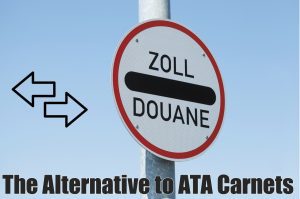The Alternative to ATA Carnets
HOME » Magazine » June 2023 » Latest News in Brief » The Alternative to ATA Carnets
You can download Peter’s complete document here.
Historic Grand Prix Cars Association Chairman Peter Horsman has used his legal background to study the actual regulations for taking racing cars from the UK into the EU for racing. He has found a solution and created a document that explains how UK domiciled racing cars (cars normally kept in the UK and therefore within the UK VAT tax net) may be temporarily exported from the UK to the EU and returned from the EU. By ‘temporary’, is meant for a period not exceeding six months at a time.

Typically, therefore, his note covers the position when a car (and spares and tools) is taken abroad for a weekend or two’s racing. It covers owners personally taking their car(s) abroad, typically by trailer. It is also relevant for taking other people’s cars to race, although not through the freight channel. The document also outlines a simple method that applies to DVLA registered vehicles owned and raced by UK resident individuals.
This procedure is an alternative to the ATA Carnet procedure, and its advantage is that it is more flexible and does not cost any money. You do not need an ATA Carnet.
Basically, from the UK perspective what is technically known as ‘Returned Goods Relief’ (sometimes called the ‘Duplicate List Procedure’) only applies to certain items, but Horseman has been advised that it does apply to racing cars temporarily exported by private individuals. This provision allows you to leave and return to the UK with your car.
From the EU perspective, things are a little more complicated. The EU Customs will want to charge you import taxes on the importation of your race car to the EU, so you have to be able to apply for regulatory relief from this obligation.
Other than the ATA Carnet procedure, there are two reliefs provided for in the EU Regulations (Commission Delegated Regulation (DA) 2015/2446) under Articles 212 and 213 (for ‘means of transport’) and Article 219 (for ‘goods intending to be used for sports purposes’. Note, not just professional sports purposes). Both reliefs cover tools and spares associated with the race car. The reliefs are known as ‘Temporary Importation Reliefs’. Article 136 allows for ‘oral declarations’ to be made at the border to claim the regulatory relief in relation to these items.
Horsman’s document goes on to explain in detail how to do this and what forms are required, as well as links to get copies of the relevant regulations in case they need to be shown at the border to a customs officer who is not familiar with them. He also explains how a road registered car may be temporarily exported and re-imported even if on a trailer and not owned by the person transporting it.
The HGPCA has successfully trialled this on the Portsmouth/Caen route with a non-road registered single seater.
Though Horsman has thoroughly researched the laws, not all customs officers will be familiar with all the clauses and exceptions in what is relatively new legislation for them, and we can give you no guarantees that you will not have a problem. You may find yourself delayed by someone who doesn’t’ know what to do. Nor can anyone answer for an individual customs officer who does not want to let you through, and we have heard stories of delays at borders caused by vigilante officers who simply want to ‘punish’ travellers from the UK for the impertinence of leaving the EU. No amount of paperwork can protect you from that.
Unfortunately the UK tax authorities have not responded to Horsman’s requests for information concerning EU cars coming to the UK for racing. In theory it should work the same way for them. However, with a lack of confirmation from HMRC, it is probably best to stick to ATA carnets when travelling with an EU car into the UK.
You can download Peter’s complete document here.
These stories are all from the pages of Historic Motor Racing News. Some have been abbreviated for this web site. If you'd like to receive the full version, please visit our subscription page where you will find postal subscriptions available. A full subscription also entitles you to access the current issue online (available soon), so you can take it with you and read it anywhere, and we are working on providing full access to our archives of back issues exclusively for our subscribers.